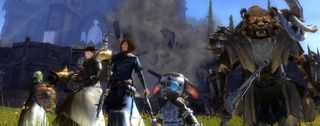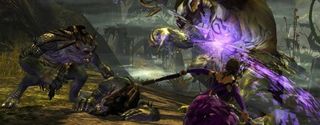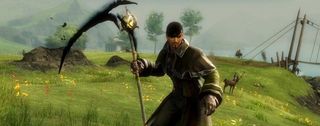Guild Wars 2 systems designer talks skill design, depth and balancing

If there had been a website somewhere during the beta where I could look up builds I probably would have done. Is that something you want to bring inside the game at all, or are you happy for people to alt-tab out?
That's one of the things that I can't talk too much about, but in Guild Wars 1 we had a lot of stuff to do exactly that and we have plans to do that.
Okay, so there'll be something to mitigate the terror of “oh god I've got 70 skill points to spend”?
What you'll also notice is that when you make a new [PvP] character, I've made the templates for all of those characters and they're all built for you. I know what weapons you're going to have, know exactly what heal you're going to have, your utilities, your elite and I've also picked all the traits for you along all your trait lines. And if you want to reset that you can but again, for the new player who has no idea what they're doing - you've got a pretty good build, go run it. And then if you want to break it down you can.
So the idea is that those default PvP builds are the jack of all trades for that class?
What I try to do with those is try to give what I think the archetype is being selected for. For instance, if I pick an Elementalist I probably want to be Gandalf, I want to be throwing some big spells, knocking up some walls. Now if I pick a warrior I'm probably thinking Conan the Barbarian, maybe Maximus from Gladiator, so I build the character that I think the typical player wants. For the Mesmer you want the tricksy guy, so I made the build that gives you the tricksy guy to begin with. We give them the base archetype I think they're going to want. If they don't want that they can just redo it themselves.

Where do you start balancing a system that's that open ended? Is there a baseline you aim for?
The biggest gaming news, reviews and hardware deals
Keep up to date with the most important stories and the best deals, as picked by the PC Gamer team.
How do you go about balancing something like this? One of things you need to do is to set a standard. What's our standard for what melee damage should be? What's our standard for what ranged damage should be? So we take those things into account but then we also have the traits, and we have the items that augment your abilities. So you need to start with the baseline for those kinds of things. Then you need to make sure that all of your traits and all of your weapons, your utilities, your heal skills, your elites - all of that stuff fits within those parameters. So you do set down a baseline and then you let the class play within those baselines.
Then you try to take stuff like, say, a knockdown. If you can knock somebody down then well I'm not doing any damage but maybe I've stopped them from using a powerful skill. Maybe I've stopped them from attacking me. Maybe I've stopped them from healing. So you need to take all those intangible things and get them into your system and figure out how much is a knockdown worth. You need to figure out that out - if this is number four out of five skills, what's it worth to not just have another skill that just does more damage?
The difference between balancing for PvE and general PvP and balancing for competitive play is pretty massive. How are you going about making sure that stuff is nailed down?
So far we've been really fortunate - we've done very few splits between PvE and PvP, it's always the same balance numbers everywhere. We knew that from day one we needed to do the PvE and the PvP. So as we were making classes, as we were making skills, as we were making traits every time we'd propose something for consideration we'd say "how does this work in PvE, how does this work in PvP, how do we balance these two together?" Then we look at the game and we say "okay, what are the tools that the PvE creatures are using? What are the tools that PvP players have at their beck and call? Then we try to say "okay, what is a PvE player going to be doing moment to moment, what is a PvP player doing moment to moment?"
We have to keep all of that in our head at the same time as we're balancing things. We do have the ability, as we need to, to take any certain skill, split it, and say that in PvE it has these numbers and in PvP it has these different numbers. The reason we try to do that as little as possible is because once you get used to your class, once you get a feel for who you are in the world, we want you to feel like you're consistent. If you're in PvE you know what you can do, if you're in PvP you know what you can do. So that's why we try to keep that as minimal as possible so that once somebody learns their character in any given format, be it PvE, PvP, WvW, they can just take that same character somewhere else and they understand what their limitations are.

So if you do make a split, do you communicate it? Not communicating it is a way of creating that sense of consistency...
Sure, sure.
...or do you just straight up say "you've got a split now"?
So right now, we're not calling out splits. But what we might do for instance in dungeons and stuff like that, we might have something that is a specific buff that only dungeon creatures use. In which case we would just call it out there, and you don't see that buff anywhere else in the game. It's still immersive, but we know that that buff only exists there so we don't need to worry about throwing players off. It's not PvP. It's not in the events. That's the way that we can keep it immersive but call it out that it is different.
Thanks to Jonathan for his time
Check out our interview with Jonathan about ArenaNet's e-sports aspirations for more of his thoughts on competition and balance. Guild Wars 2 week concludes tomorrow with a guide to getting involved with the PC Gamer war effort.
Joining in 2011, Chris made his start with PC Gamer turning beautiful trees into magazines, first as a writer and later as deputy editor. Once PCG's reluctant MMO champion , his discovery of Dota 2 in 2012 led him to much darker, stranger places. In 2015, Chris became the editor of PC Gamer Pro, overseeing our online coverage of competitive gaming and esports. He left in 2017, and can be now found making games and recording the Crate & Crowbar podcast.
Most Popular





